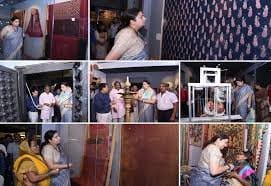Union Minister of Textiles and Women and Child Development, Smriti Zubin Irani, inaugurated Textiles Gallery at National Crafts Museum in New Delhi, today.
With this unique collection, the National Crafts Museum takes another leap to exhibit the fine Indian Craftsmanship to public. The other galleries of the museum i.e. Folk and Tribal Art, Cultic and Courtly Craft galleries have remained very famous amongst the visitors especially the foreign tourists.The village complex with huts from different states provides for the sense to rural India.
The rich collection on display will be another step towards conserving India’s rich heritage of handlooms for the next generations. The gallery will serve to be a resource centre for the students of fashion technology, apparel sciences and textiles designing. Ithas been curated with a unique design in which the master pieces of traditional handlooms are juxtaposed with modern audio-visual effects. The visitors will be able to feel the ethnicity with a soft touch of technology.
The collection has a vision to help people explore, enjoy, and rediscover the world of Indian textiles through design and technology. The Gallery consists of more than 230 different types oftextiles collections divided into categories of over more than 30 traditions.
The concept of display has been based on three categories:
Pre Loom “Ikat”, where the design is already visualized and transferred to the yarn before the yarn is placed on the loom.
On- Loom, the design is entered on the loom while weaving brocade, muslin, jamdani, weaved shawls, weaved sarees.
Post Loom, the techniques that can be done on cloth after it is woven-block printing, embroidery and kalamkaricomes in this category.
There are five zones in the gallery and each zone has been named as weaving,embroidery, dying (Ikatpatola), pattern (Bandhej, Kalamkari, and Leheria) and TanaBana based on the intricacies of the textiles.

